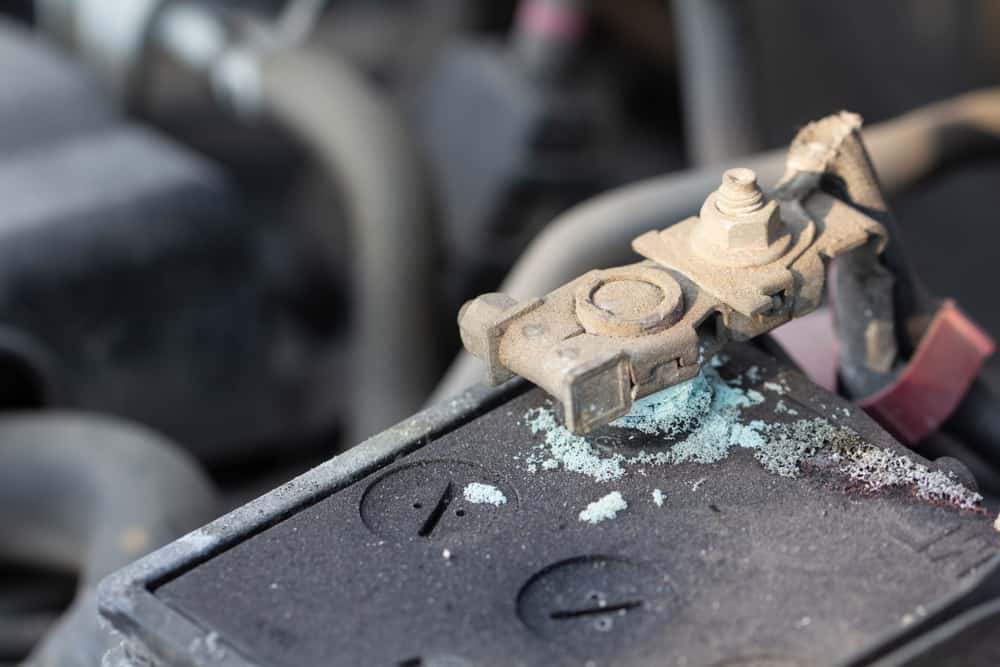Almost all electrical components in your car rely on battery performance. So, you’ll experience subpar performance whenever the car battery condition depreciates. Terminal corrosion is one of the common things that affect performance.
So, can corroded terminals cause a car not to start? Yes! This happens due to the shortage of electric power needed for the car engine to start. If the battery terminals catch corrosion, it will hinder the car’s engine from starting.
Table of Contents
- What is Corrosion?
- Common Causes of Corrosion in Auto Batteries
- Can Corroded Terminals Cause your Car Not To Start?
- What Happens When Car Battery Terminals Are Corroded?
- How To Fix Corroded Battery Terminals
- Does a Corroded Battery Need a Replacement?
- Does Corrosion Drain the Battery?
- How To Prevent Battery Terminal Corrosion
- Other Tips for Preventing Corrosion
- Conclusion
What is Corrosion?
Corrosion takes place when conductive or ferrous metals react with water. The reaction generates a bluish-gray or white residue around the metals. The accumulation will hinder the contact between the cable and the terminal, blocking the current flow.
In chemical jargon, corrosion occurs when metal is transformed to its hydroxide, sulfide, or oxide state when they get into contact with water or moisture.
Common Causes of Corrosion in Auto Batteries
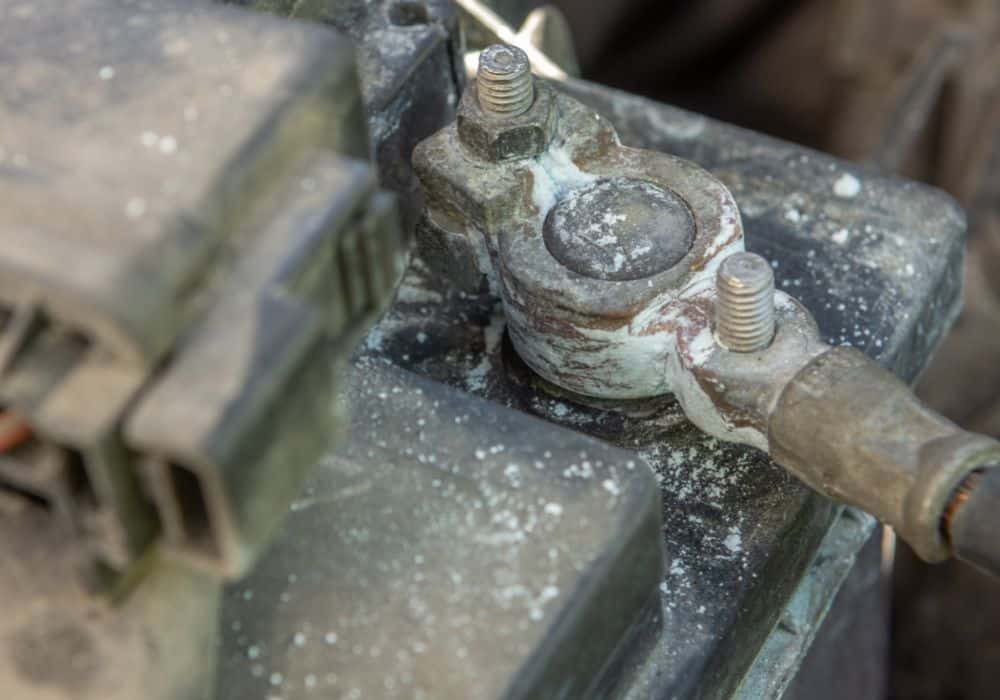
The sulfuric acid in the car battery produces hydrogen gas, which leads to battery deterioration. When the gasses react with the atmosphere, a corrosive reaction emerges. Salt and moisture act as catalysts to the process. In most cases, corrosion happens on the negative terminal, which signifies the battery is undercharged.
1. Life Span
If a battery has been operating for years, then it’s possible that the case is depreciating, causing plastic swelling and leakage. This will make the terminals and other metal parts catch corrosive gunk and residue.
2. Overfilling the Car Battery
Some car batteries need water for the acid solution to work. Filling your car battery with excessive water will lead to a battery overflow. This can cause corrosion since the water might get into contact with the terminals.
3. Leaking Car Battery
Electrolyte leaking from car batteries will come in contact with battery terminals and cause residue accumulation around it. Therefore, if you notice a leakage, solve the issue or replace the car battery since this is risky.
4. Chemical Reaction on Copper
When sulfuric gas finds its way out of a battery, it produces copper sulfate when it comes into contact with copper clamps. The chemical reaction will leave the copper sulfate residue on the terminals.
5. Overcharging the Car Battery
Overcharging a car battery will increase heat, forcing the acid solution to expand and water to evaporate. Since the electrolyte is under pressure, it will escape as a gas via the vents. The gas will react with the terminals and cause corrosion.
Can Corroded Terminals Cause your Car Not To Start?
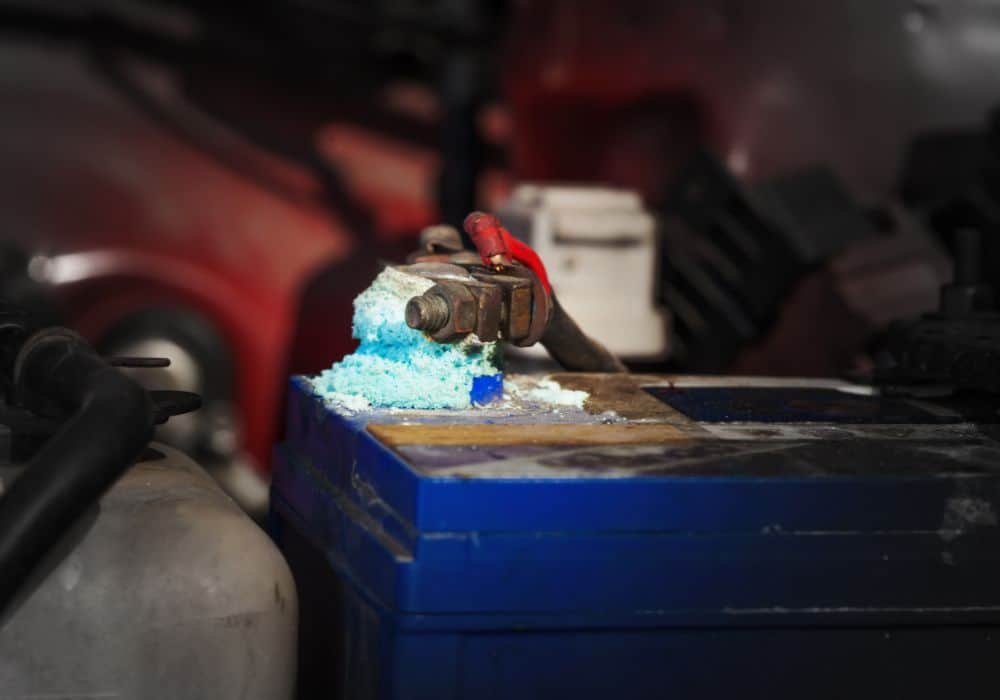
When the residue accumulation around the terminals is too much, the terminal won’t be in contact with the cable. That means your car won’t start. The car requires electric current, which flows to start. Electric current flows through two conductive or ferrous metals in contact with one another.
Regarding car batteries, the ferrous metals are the cables and battery terminals. Corrosion weakens the cable connection and metal parts. Any hindrance to the electric current flow will cause a slow start or even a zero response. When the car’s electrical system doesn’t respond optimally, and the engine refuses to start or stall, it might affect the vehicle’s onboard computer.
What Happens When Car Battery Terminals Are Corroded?
The battery’s terminal ends serve a basic but essential purpose. They connect the electrical unit of your car to the battery. Lead and other heavy-duty, high-conductive metals are used in terminal ends. These metals have lower electrical resistance. Corrosion greatly impacts an auto’s electrical system as it prevents the battering from distributing electricity.
For this reason, your car’s electrical unit starts to malfunction, and the engine stalls or declines to start. Besides, the vehicle’s onboard system might have issues.
How To Fix Corroded Battery Terminals
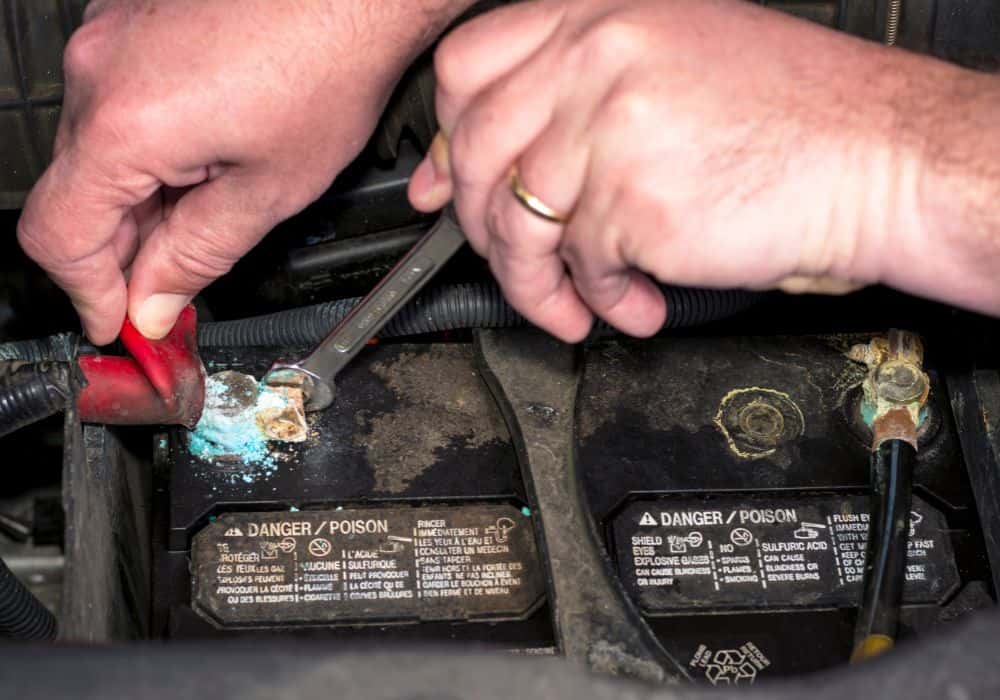
Step1: Unplug the Cables
Ensure you disconnect the negative battery cable before the positive one to avoid electrocution and severe burns.
Step2: Check Out the Cables for Damages
Non-starting car engines are usually caused by worn-out or damaged battery cables. If the wire’s insulations indicate corrosion or are frayed, peeled, splinted, cracked, or dried, you should replace them immediately.
Step3: Remove the Corrosion
- Use cleaning agent: Using commercial-grade car battery cleaners is the most effective option. It will remove the rust from the battery and neutralize the acid inside the car battery.
- Baking soda technique: Get a glass of water and some baking soda and mix them. Dip a bristle brush or an old toothbrush in the solution and scrub the affected area. Don’t allow the corrosive material or solution to fall on the engine parts to protect your car from harm.
- Rinse and let it dry: You need to scrape the corrosion away with the bristles brush or toothbrush. If this isn’t practicable, consider removing the car battery fully.
Steps to cleaning the corrosion residue
- Apply the car battery cleansing spray to the terminals and use the bristle or wire brush to get rid of the accumulation. If you are a DIY person, mix water and baking soda to form a watery paste. Apply the paste to the terminal ends and scrub. Alternatively, apply the baking soda to the terminal ends, pour water, and then scrub.
- Rinse the scum with clean water and use a clean rag to wipe it. Or, leave it to air dry for at least two hours.
Does a Corroded Battery Need a Replacement?
Corrosion will always take place as the car battery ages. That’s why you should replace an old battery whenever it shows symptoms of deterioration. You also need to change the battery if it leaks.
The terminal ends might be damaged entirely if the corrosion worsens, and you can’t use it in this condition. For that reason, you’ll need to buy a new car battery for the car to start.
Does Corrosion Drain the Battery?
In short, no. You would need a full channel from the corrosion materials to the next terminal end and also be wet. A complete route is needed for the electric current to flow. Therefore, corrosion can’t drain your car battery.
In most cases, corrosion signals that your battery is leaking, hence losing capacity. A corroded connection generates excessive resistance, making it hard for the engine to start and presenting the impression that your battery is losing power. It might appear that the battery charge is draining, but the cells’ capacity is decreasing.
How To Prevent Battery Terminal Corrosion
You can prevent car battery terminal corrosion with a terminal protector. Simply place a tiny, cylindrical sleep over the terminal ends. It’s designed with a non-conductive material; hence it won’t let the post get into contact. This not only prevents corrosion but keeps the battery terminals free from dirt.
The primary cause of terminal corrosion is the accumulation of sulfates on the lead plates in your battery. If the car battery is left in the discharged condition, the sulfates will start to crystallize and will eventually coat the lead plates. This prevents your battering from keeping the charge.
Always keeping the battery fully charged is essential since this is the best way to prevent corrosion. You can achieve this by frequently starting and driving the car or using a battery charger. If you must store the battery for a long time, ensure you disconnect the negative terminal end to stop the current flowing through the battery and make the sulfates crystalize.
Another effective way to prevent terminal corrosion is using a terminal protector, a gel you apply to the battery terminals. The protection creates a barrier between the sulfates and metal.
If the terminals are corroded, clean them using a terminal cleaner or brush. This removes the sulfates and lets the current flow.
While Battery terminal corrosion is a common issue, you can easily prevent and treat it. By following this guide, you’ll keep your car battery in perfect condition and avoid any severe damage to your vehicle.
Other Tips for Preventing Corrosion
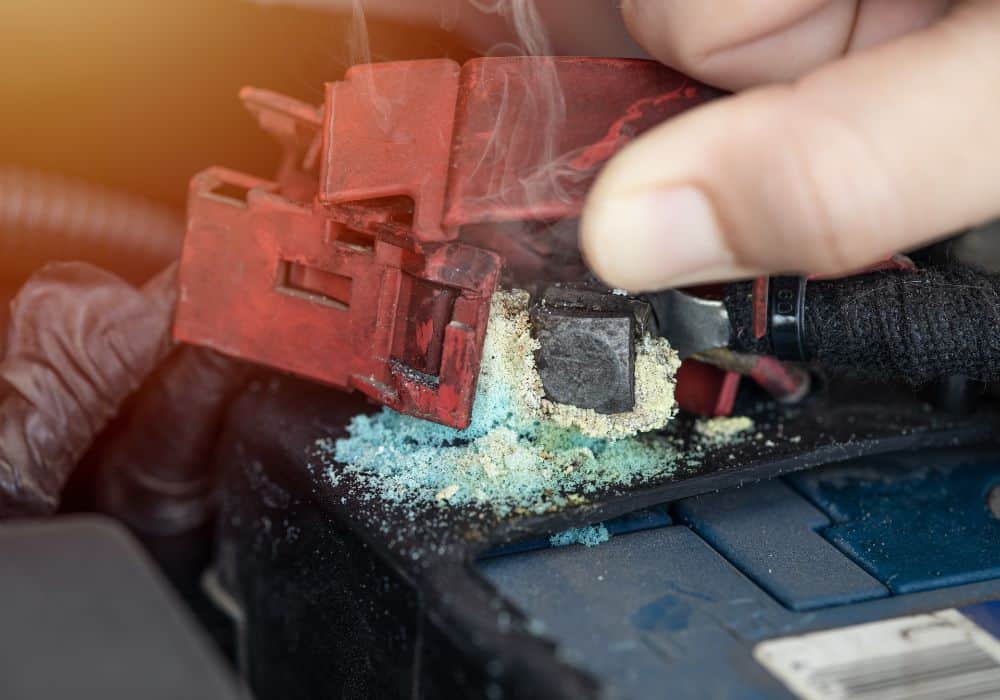
- Use anti-corrosive spray: Make sure you disconnect the cables before spraying.
- Grease or petroleum jelly: This prevents the terminals from rusting and is a cost-effective option. Don’t forget to disconnect the cables before applying.
- Frequent checks: Checking your car battery every time allows you to detect any symptoms of corrosion on time.
- Don’t overcharge: Monitor your car battery as it charges to avoid overcharging. Don’t store the battery in humid or hot places, expanding the acid solution and making it escape through the vents as gas.
- Don’t overfill: Use the recommended amount of battery water when refilling.
Conclusion
Corrosion is something you can stop; it’s a natural procedure when reactions emerge inside your car battery. As you’ve seen, corroded terminals may cause your car not to start. This corrosion creates resistance between the battery post and terminal, making the engine not start.
It would be best if you considered these things before you make a decision:
- Corroded car battery terminals can make a car’s engine not start
- Corrosion creates a faulty connection between the car and the battery, stopping the car from receiving the power it requires to start.
- This can be a scary issue, particularly if the car stops in the middle of nowhere. The best solution is to clean the terminals.
If your car fails to start, don’t assume it’s the car battery before checking the terminals. Feel free to comment if you have any questions or concerns.
